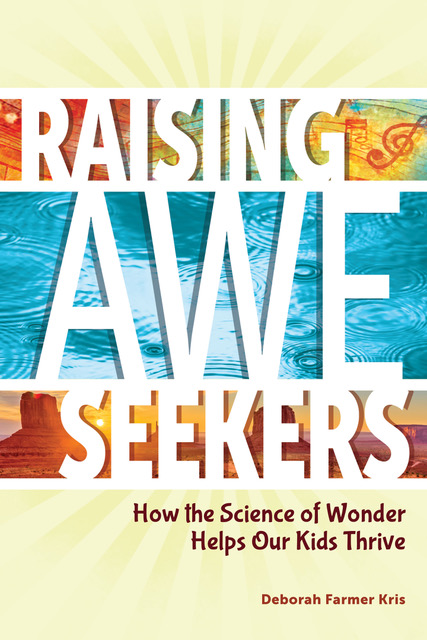 Young kids practice cognitive accommodation all the time. Think of a toddler whose only experience with dogs is the family’s small Shih Tzu. One day, the child meets the neighbor’s Great Dane. Wow! The child’s mental concept of “dog” quickly expands to include more shapes and sizes.
Young kids practice cognitive accommodation all the time. Think of a toddler whose only experience with dogs is the family’s small Shih Tzu. One day, the child meets the neighbor’s Great Dane. Wow! The child’s mental concept of “dog” quickly expands to include more shapes and sizes.
Cognitive accommodation is at the heart of good education: It is what allows students to build on prior knowledge to revise, expand, and deepen their understanding of a concept. As Summer Allen wrote in “The Science of Awe” white paper: “Awe’s ability to elicit cognitive accommodation may also explain why humans evolved to experience this unique emotion. Experiencing awe may be adaptive because it encourages us to take in new information and adjust our mental structures around this information, helping us navigate our world.”
The Awe-Curiosity Connection
“One of my favorite findings suggests that awe might help spur curiosity about the world,” psychologist Craig Anderson told me. Anderson was part of a team that studied how this emotion influenced teenagers. “The more awe they felt, the more curiosity they expressed and the better they performed in school,” he said.
Awe is sometimes described as a “knowledge emotion.” Paul Silvia, a psychology professor at the University of North Carolina, Greensboro, describes knowledge emotions as “a family of emotional states that foster learning, exploring, and reflecting.” These emotions include surprise, interest, confusion, and awe and stem from experiences that are “unexpected, complicated, and mentally challenging, and they motivate learning in its broadest sense.”
According to Silvia, awe is a powerful educational tool because it motivates people to explore things that stretch their understanding of the world. He wrote, “When people see beautiful and striking color images of supernovas, black holes, and planetary nebulas, they usually report feelings of awe and wonder. These feelings then motivate them to learn about what they are seeing and their scientific importance.”
When You Wonder, You’re Learning
None of this research would surprise Fred Rogers, for whom wonder was pedagogy. He knew that curiosity is what primes children’s brains for learning. He also had this incredible capacity to communicate his own wonder through the screen—particularly his fascination with his young viewers.
I reached out to Gregg Behr and Ryan Rydzewski, coauthors of When You Wonder, You’re Learning: Mister Rogers’ Enduring Lessons for Raising Creative, Curious, Caring Kids, to hear more about what they learned from studying Rogers’s work. They told me:
When Fred Rogers sang the words, When you wonder, you’re learning, he wasn’t kidding. In a very real sense, he was right. We know from modern science that when we’re in a state of wonder, something switches on in the brain. We start to absorb all kinds of information. And the more curiosity we feel, the more likely we are to retain that information. . . That’s why some scientists think that curiosity may be just as important as intelligence when it comes to children’s success in school.
According to researchers, curiosity has a “fundamental impact on learning and memory.” When kids are curious, they are more motivated to learn and more adept at retaining information. Think about a four-year-old who knows the name of every dinosaur, a ten-year-old who can recite and explain the g-forces of dozens of roller coasters, or a fourteen-year-old who has memorized every Hamilton lyric. No teacher has assigned this work. The four-year-old went to a natural history museum and was mesmerized by the enormous skeletons. The ten-year-old rode their first roller coaster and became fascinated by the feeling and the physics of it all. The fourteen-year-old had never heard a musical, or history, quite like this one, so they kept on listening. Awe, curiosity, learning, memory.
Here is another fantastic finding: Curiosity has an amplifying effect on other learning. One study out of the University of California, Davis, found that when participants were curious about the initial information presented to them, they could then more easily absorb unrelated information. Simply being in a curious state of mind helped participants’ brains memorize material that they were less excited about. As the study’s lead author, Matthias Gruber, said, “Curiosity may put the brain in a state that allows it to learn and retain any kind of information, like a vortex that sucks in what you are motivated to learn, and also everything around it.”8
This is news teachers and parents can use. Engaging with kids’ big questions and helping them discover what sparks their curiosity is a concrete way to support their learning in general. The challenge is not to make them fall in love with all subjects. But what if we nurtured their curiosity with one or two? What if we paid close attention to what sparked their interest, what inspired their awe, and nudged it along?
 Deborah Farmer Kris is the author of “Raising Awe-Seekers: How the Science of Wonder Can Help Our Kids Thrive.” You can follow her Substack at @raisingaweseekers or on BlueSky at @deborahfarmerkris.
Deborah Farmer Kris is the author of “Raising Awe-Seekers: How the Science of Wonder Can Help Our Kids Thrive.” You can follow her Substack at @raisingaweseekers or on BlueSky at @deborahfarmerkris.

